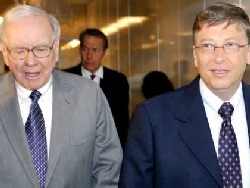 On April 1, 2011, we will be celebrating our 40th anniversary in business. M. Bryce & Associates (MBA) was founded on April Fool's day because, as my father was fond of saying, it would be our joke on the industry. Whereas a lot of companies have trouble surviving a single year, we're still trucking 40 years later. As such, we must have been doing something right. I think a lot of this could be credited to simple perseverance and determination. A lot of people wanted to see us go away, but we hung in there through sheer tenacity. When we were down, we invested in research and development. When others cut spending, we invested in ourselves.
On April 1, 2011, we will be celebrating our 40th anniversary in business. M. Bryce & Associates (MBA) was founded on April Fool's day because, as my father was fond of saying, it would be our joke on the industry. Whereas a lot of companies have trouble surviving a single year, we're still trucking 40 years later. As such, we must have been doing something right. I think a lot of this could be credited to simple perseverance and determination. A lot of people wanted to see us go away, but we hung in there through sheer tenacity. When we were down, we invested in research and development. When others cut spending, we invested in ourselves.
We trained and consulted with thousands of people and hundreds of companies in all sizes and shapes over the years. If I had to point at our single biggest contribution to the industry though it would have to be how we proved you could move the design and development of systems from an art to a science. Sure, we introduced a lot of concepts and techniques, such as Information Driven Design, Standard Systems Structure, IRM, Chronological Decomposition, and the whole methodology marketplace, but it was our insistence that systems development is a teachable science that should not be mired in hocus pocus or gobbledygook. While we have seen a lot of snake oil salesmen over the years, it was always important for us to be intellectually honest about our products, which is why we went to great lengths to define our terminology and explain our concepts. There has always been too much mumbo jumbo associated with systems and the computer industry, thereby detracting from its professional credibility, and as such, we certainly did not want to contribute to it. While others invented a whole new vocabulary to sell books, we went out of our way to keep it simple so others could learn and apply our intellectual property.
In terms of our original "PRIDE" methodology, which was also introduced in 1971, I am proud of the major systems our customers built with it. "PRIDE" revolutionized the banking systems of Japan, manufacturing and financial systems throughout the world, numerous insurance systems, and a wide variety of government systems. We were particularly proud when the State of Minnesota passed legislation mandating the use of "PRIDE" on all state system projects. While others panicked over the Y2K problem (Year 2000), "PRIDE" customers calmly entered the new millennia without a hitch.
The point is, during the heyday of "PRIDE", which was the 1970's, 80's and 90's, companies were thinking big. They had big challenges to conquer, such as building major enterprise-wide systems with integrated data bases. The executives and managers at the time were all of the "greatest generation" who had lived through World War II and the Great Depression. They therefore were not intimidated by challenges and understood the necessity of such things as discipline, organization and accountability to attack such endeavors. Maybe it was their sense of the military and the war that gave them this. Whatever it was, I doubt we will ever see such a generation of determined and resourceful people with an entrepreneurial spirit again.
What have we learned as a company over the last 40 years? Perhaps the biggest lesson was that our culture has changed dramatically, thereby affecting our work ethic and priorities. People tend to think smaller and are content putting forth just enough effort to get by. For example, designing major systems is now considered a futile effort as so many projects have failed over the years primarily because people threw too much technology at a problem and not enough management. Time and again, we've seen this backfire on companies. Now, companies are content with building nothing more than "apps." In other words, companies have resigned themselves to doing smaller things as they believe larger projects will only meet with disaster. This, of course, is a defeatist attitude, and something our early customers certainly wouldn't tolerate.
There is also a strong sense of entitlement imbued in our society whereby people believe they have certain unalienable rights to such things as income and personal property. People not only feel they deserve everything, but want it all now, today, instantaneously, which would suggest people no longer think long-term and are more inclined to be self centered and less likely to make personal sacrifices for our families, friends, companies, or whomever. This perspective also causes people to think in terms of time spent as opposed to work products produced, whereby some are more focused on the clock and not what they should be working on. In reality, the only right we truly have is the right to try and either succeed or fail. Regardless of what politicians tell us, there are no guarantees for success. Reneging on our right to fail isn't natural and discourages risk and evolution.
Not surprisingly, I have met a lot of people in my travels over the years. Among them, I have met only a handful of true geniuses in the computer field. I've also met a lot of hard workers with common sense, but not many geniuses. Unfortunately I've also seen far too many slackers who try to pass themselves off as free-spirited artists who somehow find a way to get away with murder. However, I tend to blame management who falls for the ruse rather than the charlatan. Most I.T. workers create the illusion their work is overly complicated and, as such, they should not be inhibited with such things as discipline, organization, and accountability. I have seen far too many managers become a sucker in this regard.
I wish I could say I was more optimistic, but I cannot. I see a lot of fine young people coming into the field with unbridled enthusiasm, but too few are getting the discipline and proper instruction they need to channel their energies. When I attend industry conferences, I see no significant original thinking being applied, just new technology. I tend to refer to this as "Rearranging the deck chairs on the Titanic."
It is terribly frustrating to possess a strong sense of history whereby you truly understand what is possible, but you're grounded by the realization of what is inevitable. As a country, we could have achieved a lot more over the years than we did, but we are our own worst enemy and have grasped defeat from the jaws of victory time and again. As a small example, today our systems pale in comparison to others overseas, particularly in banking.
Since 1971, our slogan has been, "Software for the finest computer - the Mind," for in the final analysis no technology can compare to the brilliance of the human brain. Over the years we have endeavored to serve our clients honorably and reputably. Our honesty and brutal frankness has served our customers well, but it has also earned us a number of detractors who were burned by our forthrightness. I guess we have always seen ourselves as the child who exclaims, "The emperor has no clothes," and I cannot possibly think how we could be otherwise.
Happy 40th anniversary MBA. No joke!
Keep the Faith!
Note: All trademarks both marked and unmarked belong to their respective companies.
 Tim Bryce is a writer and the Managing Director of M. Bryce & Associates (MBA) of Palm Harbor, Florida and has over 30 years of experience in the management consulting field. He can be reached at timb001@phmainstreet.com
Tim Bryce is a writer and the Managing Director of M. Bryce & Associates (MBA) of Palm Harbor, Florida and has over 30 years of experience in the management consulting field. He can be reached at timb001@phmainstreet.com
For Tim's columns, see:
http://www.phmainstreet.com/timbryce.htm
Like the article? TELL A FRIEND.
Tune into Tim's THE BRYCE IS RIGHT! podcast Mondays-Fridays, 11:30am (Eastern).
Copyright © 2011 by Tim Bryce. All rights reserved.
 Regardless of who is elected president in 2012, be it a Democrat or a Republican, that person will have the unenviable task of trying to heal the country. If the Democrats win, the Republicans will undoubtedly fight back, and vice versa. No matter how you slice it, it's a no-win proposition for whoever is elected as the country is irreparably split along ideological lines. In a way, the president will feel a lot like Lincoln did watching the Union crumble before his eyes.
Regardless of who is elected president in 2012, be it a Democrat or a Republican, that person will have the unenviable task of trying to heal the country. If the Democrats win, the Republicans will undoubtedly fight back, and vice versa. No matter how you slice it, it's a no-win proposition for whoever is elected as the country is irreparably split along ideological lines. In a way, the president will feel a lot like Lincoln did watching the Union crumble before his eyes. I often marvel at the mega food stores scattered around the country, be it a Super Walmart, Publix, Kroger, or whatever. They're a lot different than the corner grocery markets I used to frequent when I was a kid. Back then "the corner store" had everything the people in the neighborhood needed. Why? Because the shopkeepers knew their neighbors and catered to their needs. It's substantially different today as you enter stores that could easily serve as a hangar for a Boeing 747 with massive parking lots that Disney would be proud of.
I often marvel at the mega food stores scattered around the country, be it a Super Walmart, Publix, Kroger, or whatever. They're a lot different than the corner grocery markets I used to frequent when I was a kid. Back then "the corner store" had everything the people in the neighborhood needed. Why? Because the shopkeepers knew their neighbors and catered to their needs. It's substantially different today as you enter stores that could easily serve as a hangar for a Boeing 747 with massive parking lots that Disney would be proud of. I have heard a lot of whoppers over the years, but nothing like film maker Michael Moore who recently threw his support behind the Wisconsin unions. His remarks, which were reported in the
I have heard a lot of whoppers over the years, but nothing like film maker Michael Moore who recently threw his support behind the Wisconsin unions. His remarks, which were reported in the  This is part three of a three part series which describes the fundamentals of management and should be of particular interest to young people entering the work force or as a refesher for managers. It is an excerpt from my book, "MORPHING INTO THE REAL WORLD - A Handbook for Entering the Work Force" which is a survival guide for young people as they transition into adult life. The book is available from MBA Press through our
This is part three of a three part series which describes the fundamentals of management and should be of particular interest to young people entering the work force or as a refesher for managers. It is an excerpt from my book, "MORPHING INTO THE REAL WORLD - A Handbook for Entering the Work Force" which is a survival guide for young people as they transition into adult life. The book is available from MBA Press through our  In a perfect world, people who develop systems and software for companies would define data elements in a standard and consistent manner, particularly key primary elements such as "Customer Number" and "Product Number," and calculated items like "Net Pay," and "Gross Sales." Unfortunately, this is not always the case. For example, I had a systems manager in a western state government agency tell me he conservatively estimated that "Employee Number" was defined over 150 different ways in his agency alone. Standardization of Data Definitions (DD) provides the means to reuse such items over and over again thereby saving time during development and providing the means to integrate systems and software. Without DD uniformity though data redundancy and erroneous calculations are not only possible it is highly likely thereby causing maintenance headaches as well as incurring skepticism in the integrity of the resulting information (aka, "dirty" information), thereby triggering additional rework of programs and business processes. Reusability simplifies maintenance and enhancements, expedites development efforts and promotes the concept of a true data base environment to integrate all of a company's systems and software. The benefits far outweigh the negatives which is nothing more than to simply take the time to properly document a data element. When it is done though, it is done and can be reused by everyone, not just one person.
In a perfect world, people who develop systems and software for companies would define data elements in a standard and consistent manner, particularly key primary elements such as "Customer Number" and "Product Number," and calculated items like "Net Pay," and "Gross Sales." Unfortunately, this is not always the case. For example, I had a systems manager in a western state government agency tell me he conservatively estimated that "Employee Number" was defined over 150 different ways in his agency alone. Standardization of Data Definitions (DD) provides the means to reuse such items over and over again thereby saving time during development and providing the means to integrate systems and software. Without DD uniformity though data redundancy and erroneous calculations are not only possible it is highly likely thereby causing maintenance headaches as well as incurring skepticism in the integrity of the resulting information (aka, "dirty" information), thereby triggering additional rework of programs and business processes. Reusability simplifies maintenance and enhancements, expedites development efforts and promotes the concept of a true data base environment to integrate all of a company's systems and software. The benefits far outweigh the negatives which is nothing more than to simply take the time to properly document a data element. When it is done though, it is done and can be reused by everyone, not just one person. My wife and I recently made a pilgrimage to New York City to celebrate our 30th wedding anniversary. As usual, we enjoyed outstanding dining, listened to some superb jazz in the Village, and of course, checked on the weirdos in Times Square. Best of all, we got to visit with our daughter who works in the city. At the time it was just between winter and spring. It was still cold, but you could visibly see signs of spring starting to appear. Late one afternoon, I craved a cigar and decided to go out in front of my daughter's apartment building to smoke one. It was still cold outside but it was a beautiful day nonetheless. As I stood outdoors, I looked around my daughter's neighborhood and studied the local architecture, which I judged to be built well before World War II. As it was a nice day and I was enjoying my cigar, I was in somewhat of a jovial mood. As people passed by me on the sidewalk I would try to be pleasant and say something like, "Beautiful day isn't it?" or simply "Good afternoon" or "Hello." Unfortunately, the sentiment was not reciprocated by the passersby who all kept looking forward in mute silence. At first I thought maybe there was a problem with myself, that perhaps I looked too menacing (cigars tend to do that) or perhaps they didn't understand my language; after all, New York City is the melting pot of the United States with many cultures residing within it. I decided, No, it was nothing more than the mental toughness of New Yorkers.
My wife and I recently made a pilgrimage to New York City to celebrate our 30th wedding anniversary. As usual, we enjoyed outstanding dining, listened to some superb jazz in the Village, and of course, checked on the weirdos in Times Square. Best of all, we got to visit with our daughter who works in the city. At the time it was just between winter and spring. It was still cold, but you could visibly see signs of spring starting to appear. Late one afternoon, I craved a cigar and decided to go out in front of my daughter's apartment building to smoke one. It was still cold outside but it was a beautiful day nonetheless. As I stood outdoors, I looked around my daughter's neighborhood and studied the local architecture, which I judged to be built well before World War II. As it was a nice day and I was enjoying my cigar, I was in somewhat of a jovial mood. As people passed by me on the sidewalk I would try to be pleasant and say something like, "Beautiful day isn't it?" or simply "Good afternoon" or "Hello." Unfortunately, the sentiment was not reciprocated by the passersby who all kept looking forward in mute silence. At first I thought maybe there was a problem with myself, that perhaps I looked too menacing (cigars tend to do that) or perhaps they didn't understand my language; after all, New York City is the melting pot of the United States with many cultures residing within it. I decided, No, it was nothing more than the mental toughness of New Yorkers. Not long ago you heard me talk about how things seem to come in threes, such as accidents, deaths, or other forms of misfortune. This recently happened to me unexpectedly when my laundry dryer died, along with my outside weed trimmer, and leaf blower. I guess I should have anticipated them breaking down as they were all getting old, but for some reason they all decided to stop working on the same day. Kaput! This, of course, forced me to purchase replacements, something I didn't relish as I seem to have developed a knack for selecting the wrong product. In the past, I would go to a super hardware store (I won't mention any names here, but you know who I mean) where I had plenty to chose from at bargain prices, but nobody to talk to about the product. If by chance you were able to tackle a sales clerk, they of course knew nothing about the products. This approach resulted in me purchasing a long line of lousy products that didn't last long, particularly weed trimmers.
Not long ago you heard me talk about how things seem to come in threes, such as accidents, deaths, or other forms of misfortune. This recently happened to me unexpectedly when my laundry dryer died, along with my outside weed trimmer, and leaf blower. I guess I should have anticipated them breaking down as they were all getting old, but for some reason they all decided to stop working on the same day. Kaput! This, of course, forced me to purchase replacements, something I didn't relish as I seem to have developed a knack for selecting the wrong product. In the past, I would go to a super hardware store (I won't mention any names here, but you know who I mean) where I had plenty to chose from at bargain prices, but nobody to talk to about the product. If by chance you were able to tackle a sales clerk, they of course knew nothing about the products. This approach resulted in me purchasing a long line of lousy products that didn't last long, particularly weed trimmers. One of the most fascinating aspects of the recent budget debates in Wisconsin was the delineation of political ideologies. Rarely have I seen it as clearly defined as exhibited in Madison, but this is just the start as more states are likely to propose similar legislation soon. Conservative Republicans are at a loss as to why their counterparts do not seem to grasp the significance of budget deficits. Liberal Democrats claim the Republicans are putting the burden unfairly on the backs of the working class as opposed to the rich and corporations. Both sides adamantly defend their opinion hence the confrontational demonstrations in Wisconsin with neither side budging. Both sides are speaking but nobody is listening. We're at loggerheads, a stalemate, which will remain in effect for several years to come.
One of the most fascinating aspects of the recent budget debates in Wisconsin was the delineation of political ideologies. Rarely have I seen it as clearly defined as exhibited in Madison, but this is just the start as more states are likely to propose similar legislation soon. Conservative Republicans are at a loss as to why their counterparts do not seem to grasp the significance of budget deficits. Liberal Democrats claim the Republicans are putting the burden unfairly on the backs of the working class as opposed to the rich and corporations. Both sides adamantly defend their opinion hence the confrontational demonstrations in Wisconsin with neither side budging. Both sides are speaking but nobody is listening. We're at loggerheads, a stalemate, which will remain in effect for several years to come. Over the years I have learned to appreciate the power of "three" which is hardly a new concept. The ancient Egyptians coveted the "three" and exemplified its use as triads in their pyramids thereby providing a path for deceased pharaohs to transcend to the sun as the "King of the Dead." Just about every religion and philosophy pays respect to the concept of "three." For example, in the Christian world, we respect the Holy Trinity.
Over the years I have learned to appreciate the power of "three" which is hardly a new concept. The ancient Egyptians coveted the "three" and exemplified its use as triads in their pyramids thereby providing a path for deceased pharaohs to transcend to the sun as the "King of the Dead." Just about every religion and philosophy pays respect to the concept of "three." For example, in the Christian world, we respect the Holy Trinity. As I was growing up, it was impressed upon me that breakfast was the most important meal of the day. We therefore always had something to eat before going off to school, be it eggs, oat meal, cereal, pancakes, etc. You have to remember this was well before the advent of toaster strudel or instant French toast or waffles. I don't know which was more important though, eating the meal or sitting down with the family before we all scattered to the four winds. Breakfast was useful for me to wake up and converse with other human beings before I had to face the rest of the world. My parents made sure I was properly prepped for the day. I therefore concluded the value of breakfast was not so much the meal itself, but that it put me in the proper frame of mind to tackle my assignments for the day.
As I was growing up, it was impressed upon me that breakfast was the most important meal of the day. We therefore always had something to eat before going off to school, be it eggs, oat meal, cereal, pancakes, etc. You have to remember this was well before the advent of toaster strudel or instant French toast or waffles. I don't know which was more important though, eating the meal or sitting down with the family before we all scattered to the four winds. Breakfast was useful for me to wake up and converse with other human beings before I had to face the rest of the world. My parents made sure I was properly prepped for the day. I therefore concluded the value of breakfast was not so much the meal itself, but that it put me in the proper frame of mind to tackle my assignments for the day.